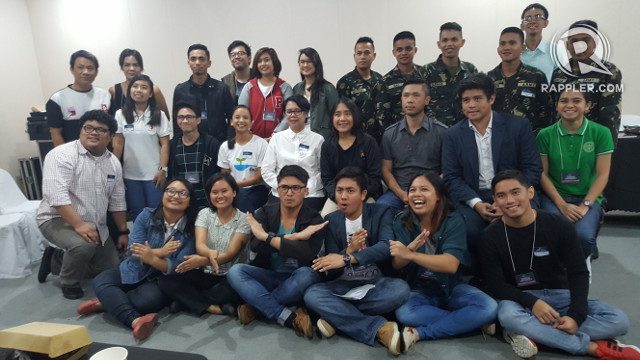SUMMARY
This is AI generated summarization, which may have errors. For context, always refer to the full article.

MANILA, Philippines – Innovations that changed the world all began as ideas. Rappler’s Social Good Summit on Saturday, September 24, came up with 6 ideas aiming to prepare the Philippines for the biggest environmental challenges to face humanity – climate change and disasters.
A mobile app allows bikers to become emergency responders. Emergency stations can be powered by the sun. Here are the 6 ideas to make the country disaster-prone and climate-resilient.
Jack and the Bin Stalk
Getting households to properly segregate their garbage has been a long-running problem in the Philippines. It has yet to become a regular habit among Filipinos despite a comprehensive solid waste management law and a number of local ordinances.
A technologically savvy youth group decided to take on this problem using a combination of hardware and software, providing monetary incentives for households to segregate garbage properly.
The hardware comes in the form of a special segregation bin that is “compact and portable.” The software is a garbage collection application system that awards households with points for segragating their trash and connects them to junk shops in Biñan, where the households can earn from selling recyclable scraps.
“We’re giving waste a value,” said Domyson Abuan, a public school teacher who helped start the group.
Jack and the Bin Stalk aims to adopt 50 households in Biñan to test their idea. Based on the group’s observation, a typical Filipino household in Biñan generates up to 7 kilograms of waste a day.
BLOC Camp Site
BLOC camp sites seek to be the answer to the lack of immmediate and reliable emergency shelters in the Philippines, a country deemed one of the most vulnerable to natural disasters because of its location in the Pacific Ocean.
The country experience after Super Typhoon Yolanda (Haiyan), one of the strongest typhoons that flattened many parts of central Philippines, highlighted the urgency of preparing emergency shelters for Filipinos living in storm paths.
A BLOC Camp Site is powered by a renewable energy and outfitted with a water catchment system. Its pilot “camp site” in Lumban, Laguna is proving to be a success, according to Philip Inno, a consultant for the group.
The camp site has also turned into a tourist attraction, a destination for glamping or “glamorous camping.”
The group hopes to build more camp sites in other disaster-prone areas in the country.
Bike Scouts Philippines and Goozam
In today’s hyperconnected world, the problem is not so much about connecting a person in danger to the nearest emergency responder. The challenge is making sure the emergency responder is able and equipped to provide the necessary assistance.
Bridging the gap between information and action is what Bike Scouts Philippines and Goozam app want to address.
Bike Scouts Philippines first saw action in the aftermath of Super Typhoon Yolanda when its members biked to isolated towns and villages, collected names of casualties, and disseminated the information through Rappler.
Goozam, an “on demand, geo context” app that started in California’s Los Angeles City, allows people in danger to send a distress signal to people nearby who are using same app.
The app, the “tech element” of the initiative, gathers information on people who need emergency assistance and makes the information available to Bike Scouts Philippines, the “human element,” which then provides the on-the-ground help, explained Elijah Cruz, the promoter of the app in the Philippines.
Project Apollo
A 19-year-old University of Santo Tomas engineering student decided he wanted to build solar power charging stations in far-flung communities using locally-sourced materials. Darryl Limpin likens his charging station to smartphone charging stations in convenience stores, except his invention will be powered by solar panels and will be located in remote villages.
Limpin said his project is feasible now because the costs of building solar panels, buying batteries, and constructing structures to house the entire set-up have become cheaper.
He envisions power stations that can charge entire houses for 24 hours, a definite boon in times of typhoons or other calamities that can cut off power supply from communities.
Walang Pasok System
Prompt announcements of the suspension of classes are critical in times of typhoons. They save lives by keeping students safe inside their homes when storms get violent.
Walang Pasok System is an app that aims to facilitate better coordination between students, parents, local government officials, school authorities and government weather monitoring agencies to ensure announcements are disseminated as soon as possible.
The app also aims to promote understanding of the weather and disaster preparedness, crucial for typhoon-prone communities.
Ralph Abainza, one of the initiative’s founders, said they want to move on to the consultation stage where they can ask stakeholders what features they want added in the app.
Tree-planting by the Philippine military
The Armed Forces of the Philippines have a nationwide presence and lots of manpower, making them perfect partners in restoring the country’s forest cover.
2nd Lieutenant Antonio Amancio Tanque Jr says the AFP has planted 4 to 5 million trees since 2010. The projects are usually initiatives of other government agencies like the Department of Environment and Natural Resources or private groups like companies or non-governmental organizatons.
The AFP comes in when these groups are in need of manpower to actually take the seedlings to planting sites, typically difficult to access, and do the planting.
Tanque says the military takes care of seedlings after planting, unlike some reforestation projects that don’t check on the seedlings afterward. – Rappler.com
Show the world your game-changing ideas and inspire other. Check out our best deals on the latest tech.
Add a comment
How does this make you feel?
There are no comments yet. Add your comment to start the conversation.